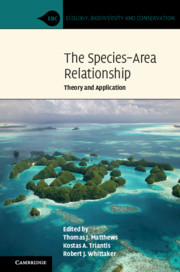Book contents
- The Species–Area Relationship
- Ecology, Biodiversity and Conservation
- The Species–Area Relationship
- Copyright page
- Contents
- Contributors
- Foreword
- Preface
- Part I Introduction and History
- Part II Diversity–Area Relationships: The Different Types and Underlying Factors
- Part III Theoretical Advances in Species–Area Relationship Research
- 7 Mathematical Expressions for the Species–Area Relationship and the Assumptions behind the Models
- 8 Biodiversity Scaling on a Continuous Plane: Geometric Underpinnings of the Nested Species–Area Relationship
- 9 Species Accumulation Curves and Extreme Value Theory
- 10 The Species–Area Relationship: Idiosyncratic or Produced by ‘Laws Acting around Us’?
- 11 The Species–Area Relationships of Ecological Neutral Theory
- 12 On the Interface of Food Webs and Spatial Ecology: The Trophic Dimension of Species–Area Relationships
- Part IV The Species–Area Relationship in Applied Ecology
- Part V Future Directions in Species–Area Relationship Research
- Index
- References
10 - The Species–Area Relationship: Idiosyncratic or Produced by ‘Laws Acting around Us’?
from Part III - Theoretical Advances in Species–Area Relationship Research
Published online by Cambridge University Press: 11 March 2021
- The Species–Area Relationship
- Ecology, Biodiversity and Conservation
- The Species–Area Relationship
- Copyright page
- Contents
- Contributors
- Foreword
- Preface
- Part I Introduction and History
- Part II Diversity–Area Relationships: The Different Types and Underlying Factors
- Part III Theoretical Advances in Species–Area Relationship Research
- 7 Mathematical Expressions for the Species–Area Relationship and the Assumptions behind the Models
- 8 Biodiversity Scaling on a Continuous Plane: Geometric Underpinnings of the Nested Species–Area Relationship
- 9 Species Accumulation Curves and Extreme Value Theory
- 10 The Species–Area Relationship: Idiosyncratic or Produced by ‘Laws Acting around Us’?
- 11 The Species–Area Relationships of Ecological Neutral Theory
- 12 On the Interface of Food Webs and Spatial Ecology: The Trophic Dimension of Species–Area Relationships
- Part IV The Species–Area Relationship in Applied Ecology
- Part V Future Directions in Species–Area Relationship Research
- Index
- References
Summary
Ecologists generally hold out hope that a unified understanding of ecosystems is possible because, in Darwin’s words, they are governed by 'laws acting around us'. But at the same time, ecologists take delight in the idiosyncrasies of nature, in the features that are unique to an organism or an ecosystem, in the phenomena that resist general theory. Sometimes this duality leads particularists to condemn the search for laws and universal theory and theorists to denigrate natural history as stamp collecting. Such conflicts are foolish. Here I demonstrate that the search to understand the species–area relationship (SAR) and the other patterns studied by macroecologists as well, exemplify how a well-defined boundary can be drawn between two legitimate domains: the phenomena that are unified by theory and those that are idiosyncratic.
Keywords
- Type
- Chapter
- Information
- The Species–Area RelationshipTheory and Application, pp. 227 - 258Publisher: Cambridge University PressPrint publication year: 2021

